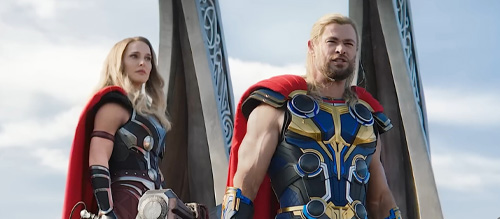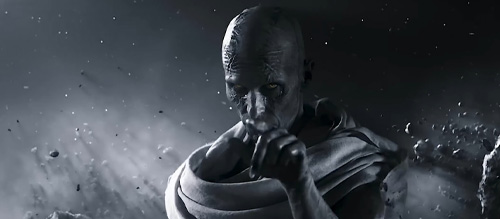Thor: Love and Thunder (2022) Review

Thor: Love and Thunder (2022)
Director: Taika Waititi
Screenwriters: Taika Waititi, Jennifer Kaytin Robinson
Starring: Chris Hemsworth, Christian Bale, Natalie Portman, Tessa Thompson, Taika Waititi, Russell Crowe, Jamie Alexander
In 2014, Jason Aaron and Russell Dauterman introduced to Marvel Comics the Mighty Thor, a female wielder of Mjolnir, and secretly Dr Jane Foster gaining a reprieve from terminal cancer through Asgardian magic in one of the best comic book runs of the last decade. Natalie Portman, aside from a single scene without dialogue in Avengers: Endgame, hasn’t been seen in the MCU since 2013’s Thor: The Dark World but now she’s back, likely because this time Jane gets to be a superhero. Thor himself is back as well of course and treading some familiar ground in his latest adventure.
After playing his part in saving the universe from Thanos, God of Thunder Thor (Chris Hemsworth) has got his god bod back and is off adventuring with the Guardians of the Galaxy. His world is turned upside down when former paramour Jane Foster (Natalie Portman) reappears in his life now bestowed with Asgardian powers, and a dangerous new foe emerges in the shape of Gorr (Christian Bale), a being who carries a weapon capable of slaying any god.
In a typically Waititi off-kilter choice, this is a rom-com between two exes and their jealous hammers. It’s so gratifying for fans of the Jane Foster Thor run to see Mjolnir and Stormbreaker given such vivid personalities, an idea that became prominent in that era of the comics. You expect there to be some form of resolution to Thor and Jane’s prematurely ended relationship, but their chosen weapons being anthropomorphised as the third wheels in this love story is just such a lovely absurdist touch.
Natalie Portman getting to be both a kick-ass action hero and the emotional heart of the film makes her the undoubted highlight, but props to Christian Bale for playing his role with as much deranged commitment as any of his Oscar-nominated work. Gorr the God-Butcher is easily the most frightening and magnetic antagonist of the Thor franchise, as well as being (like Black Panther‘s Killmonger) another Marvel villain whose worldview is very difficult to not empathise with.

The gods are all going to be killed, but since most gods are shown in no uncertain terms to be bastards, would that be such a bad thing? The very first thing we see in the movie is Gorr’s origin story; having his faith crushed by a pitiless and cruelly mocking god, and pretty much every non-Asgardian divine entity we see is some shade of awful.
Enter Zeus (an entertainingly over the top Russell Crowe with a thick Greek accent), the bastard-god to beat all bastard-gods. He holds court at the gleaming, hedonistic Omnipotence City, and is far more concerned with human sacrifice leaderboards and daily orgies than heeding Thor’s warning of a deity serial killer or offering assistance in the upcoming fight.
The script by Waititi and TV writer Jennifer Kaytin Robinson could definitely have been tighter. Most of the film’s flaws become apparent in the first hour, which is, to be blunt, a mess. Thor latches on to the Guardians of the Galaxy like a blonde limpet and they keep trying to shake him off to get on with the next film in their own franchise. And, just like Shrek, the God of Thunder is out to re-learn the exact same lesson he learned in his three previous movies. For the ogre it was “be yourself”, and for the Asgardian it’s “be worthy of being a hero”.
Perhaps the most pressing question is: why does some of this look so cheap? The big VFX-driven extravaganzas (including a golden blood-drenched god brawl and a late scene involving empowering the powerless) are all dazzling enough, but why do our heroes spend so much time standing around in their plastic armour in big empty rooms or featureless backlots with a vaguely fantastical projection behind them in a $250 million blockbuster?
Such moments are all the more glaring when Waititi can create sequences of such a striking aesthetic as when our heroes go to confront Gorr in the monochromatic Shadow Realm. Battling Bale’s character and his shadow monsters on a black-and-white planetoid with superpowers brightly illuminating and cutting through the greyscale makes pretty much everything else in the film look terrible in comparison.
Waititi sometimes needs to rein himself in a little. He’s a funny guy but didn’t need to lean so heavily on the screaming goat meme (which is funny precisely once) nor make his rock man Korg as prominent with his constant stream of innocent misunderstandings instantly diffusing any character tension. On the one hand you have the undeniably amusing sight of a Kronen (Korg’s rocky alien race) with a handlebar moustache, but on the other he gives his character not one, not two, but three “gather round and let me tell you a story” scenes that become less funny through repetition.
Once it works out what film it wants to be and especially when our attention is on Portman or Bale, Thor: Love and Thunder is ace. When it tries to do justice to the rest of its colourful ensemble, including its titular character, it is a bit more inconsistent. Tessa Thompson’s alcoholic warrior Valkyrie, a highlight of Thor: Ragnarok and now crowned King of New Asgard, gets token references to her sexuality and a few memorable action beats but often feels like an afterthought, even to the extent of one shot that looks suspiciously unfinished, like she’s jumping down from a box rather than from her winged steed.
There’s fun to be had with Thor: Love and Thunder, but it’s far too inconsistent to trouble the best of the Marvel movies, even Waititi’s own previous effort.
Score: 15/24
Recommended for you: Every MCU Marvel Cinematic Universe Movie Ranked

